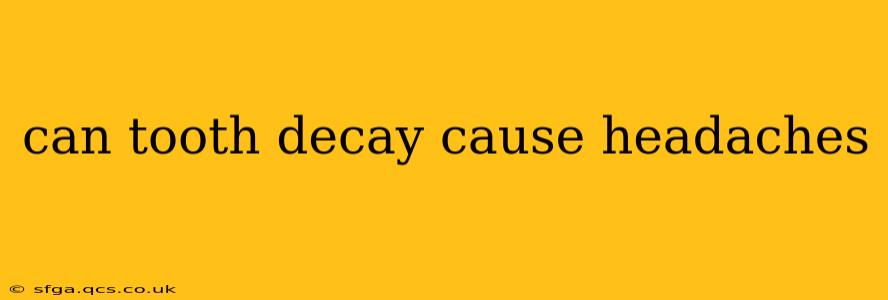Toothaches are undeniably painful, but did you know that untreated tooth decay can lead to headaches? Many people experience this connection, often overlooking the oral source of their head pain. This comprehensive guide explores the relationship between tooth decay and headaches, answering common questions and providing valuable insights into prevention and treatment.
How Can Tooth Decay Lead to Headaches?
The link between tooth decay and headaches isn't always immediately apparent. However, severe tooth decay can trigger a cascade of events that result in head pain. Here's how:
-
Inflammation and Infection: Decayed teeth harbor bacteria, leading to infection and inflammation of the tooth's pulp (the inner part containing nerves and blood vessels). This inflammation can spread to surrounding tissues, causing pressure and pain that radiates to the head.
-
Sinus Pressure: The upper teeth are located close to the sinuses. Severe tooth infections in the upper jaw can put pressure on the sinuses, leading to sinus headaches, characterized by pain in the forehead, cheeks, and around the eyes.
-
Referred Pain: Nerve pathways in the head and face are complex. Pain originating from a decayed tooth can be misinterpreted by the brain as pain in another area, such as the head or temple, leading to a headache. This is known as referred pain.
-
Temporomandibular Joint (TMJ) Disorder: Severe tooth decay and resulting pain can cause you to clench or grind your teeth, straining the temporomandibular joint (TMJ) which connects your jaw to your skull. This can lead to TMJ disorders, resulting in headaches and facial pain.
What Types of Headaches Can Tooth Decay Cause?
Tooth decay-related headaches can manifest as several types:
-
Tension Headaches: These are often described as a tight band squeezing the head. They can be caused by the stress and tension associated with persistent tooth pain.
-
Sinus Headaches: As mentioned earlier, infection from upper teeth can directly impact the sinuses, leading to sinus headaches.
-
Migraines: While not directly caused by tooth decay, the intense pain and inflammation associated with a severe dental infection can trigger migraines in susceptible individuals.
Can a Toothache Cause a Headache on One Side of the Head?
Yes, a toothache can absolutely cause a headache on one side of the head. The location of the decayed tooth usually dictates the side of the head experiencing the pain. If the pain is on the right side of your jaw, the headache will likely be felt on the right side of your head.
How Long Does a Headache from a Toothache Last?
The duration of a headache caused by a toothache varies depending on the severity of the decay and the response to treatment. If left untreated, the headache could persist for days or even weeks. However, once the underlying dental issue is addressed, the headache usually subsides.
How to Treat Headaches Caused by Tooth Decay?
The most effective way to treat headaches caused by tooth decay is to address the underlying dental problem. This usually involves:
-
Visiting a Dentist: A dentist can diagnose the problem accurately and recommend the appropriate treatment, such as a filling, root canal, or tooth extraction.
-
Pain Relief: Over-the-counter pain relievers like ibuprofen or acetaminophen can help manage the pain temporarily, but they won't cure the underlying dental problem.
-
Antibiotics: In cases of severe infection, antibiotics may be necessary to fight the infection and reduce inflammation.
Preventing Headaches Associated with Tooth Decay:
Preventing tooth decay is the best way to avoid headaches linked to dental problems. This includes:
-
Regular Dental Checkups: Regular visits to the dentist for checkups and cleanings are crucial for early detection and prevention of decay.
-
Good Oral Hygiene: Practice meticulous oral hygiene by brushing and flossing twice daily.
-
Healthy Diet: Limit sugary and acidic foods and drinks that contribute to tooth decay.
In conclusion, while not always immediately obvious, tooth decay can indeed cause headaches. Ignoring dental problems can lead to prolonged and intensifying pain. Therefore, prioritizing regular dental checkups and maintaining good oral hygiene are essential for preventing both tooth decay and the associated headaches. If you suspect a toothache is the source of your headache, consult a dentist immediately.
